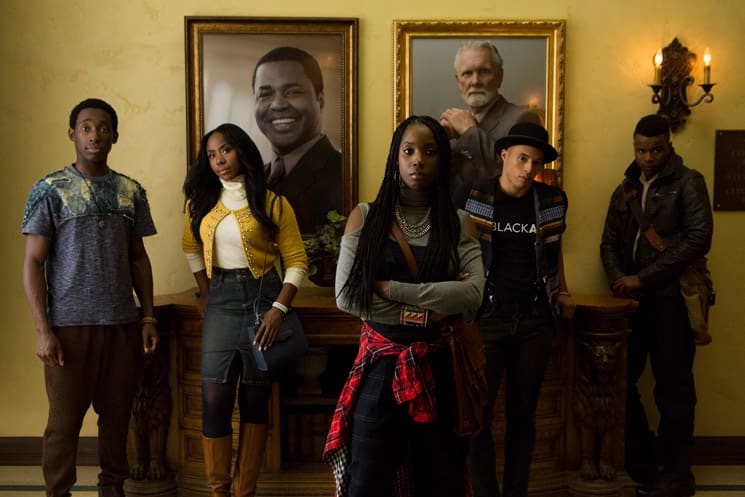Justin Simien's debut feature film Dear White People was a near-perfect outing, though its one issue was pacing. The film felt like it bit off more than it could chew in its 108 minutes, attempting to unpack racial issues both big and small while adhering to the constraints of a reasonable runtime. As such, the film and its characters make for the rare movie outing that actually benefits from an episodic adaptation.
Netflix's ten-episode Dear White People takes everything that was good about the movie and expands on it with great success. Like the film, the show follows a group of African-American students at an Ivy League university, each of whom fall on different places in the spectrum of wokeness. Thanks to its detailed characters and ability to take its time, the show expertly comments on racism writ large along with the minutiae of the black college experience.
It's also, naturally, the sort of show that has riled up a great deal of idiots in various comment sections around the web. This is addressed through some serious meta acrobatics — in this show based on a movie, there's a third property called "Dear White People" in a college radio program hosted by Samantha (played by Logan Browning, doing an excellent job to rival Tessa Thompson's turn in the original film). The radio show is fiery and confrontational, taking aim at the so-called post-racial liberals whose inherent racism is barely hidden by self-serving good intentions.
As such, Samantha spends a lot of time defending "Dear White People" (and, by extension, Dear White People) from a great deal of ignorant trolls, shooting down accusations of "reverse racism" and other flimsy arguments.
With that out of the way early on, the show is able to continue its deep exploration of college life for a group of studious African-Americans. Picking up right where the movie left off, the show expertly balances social commentary with laugh-out-loud comedy, and there's plenty of young adult romance thrown into the mix for good measure.
Dear White People is not likely to convince a young alt-righter to grow out their Hitler haircut and embrace intersectionality, but that's not the show's intent. Instead, it's a refreshing and vivacious college comedy that explores race and society without ever feeling heavy-handed. As its title suggests, white people ought to pay attention.
(Netflix)Netflix's ten-episode Dear White People takes everything that was good about the movie and expands on it with great success. Like the film, the show follows a group of African-American students at an Ivy League university, each of whom fall on different places in the spectrum of wokeness. Thanks to its detailed characters and ability to take its time, the show expertly comments on racism writ large along with the minutiae of the black college experience.
It's also, naturally, the sort of show that has riled up a great deal of idiots in various comment sections around the web. This is addressed through some serious meta acrobatics — in this show based on a movie, there's a third property called "Dear White People" in a college radio program hosted by Samantha (played by Logan Browning, doing an excellent job to rival Tessa Thompson's turn in the original film). The radio show is fiery and confrontational, taking aim at the so-called post-racial liberals whose inherent racism is barely hidden by self-serving good intentions.
As such, Samantha spends a lot of time defending "Dear White People" (and, by extension, Dear White People) from a great deal of ignorant trolls, shooting down accusations of "reverse racism" and other flimsy arguments.
With that out of the way early on, the show is able to continue its deep exploration of college life for a group of studious African-Americans. Picking up right where the movie left off, the show expertly balances social commentary with laugh-out-loud comedy, and there's plenty of young adult romance thrown into the mix for good measure.
Dear White People is not likely to convince a young alt-righter to grow out their Hitler haircut and embrace intersectionality, but that's not the show's intent. Instead, it's a refreshing and vivacious college comedy that explores race and society without ever feeling heavy-handed. As its title suggests, white people ought to pay attention.
